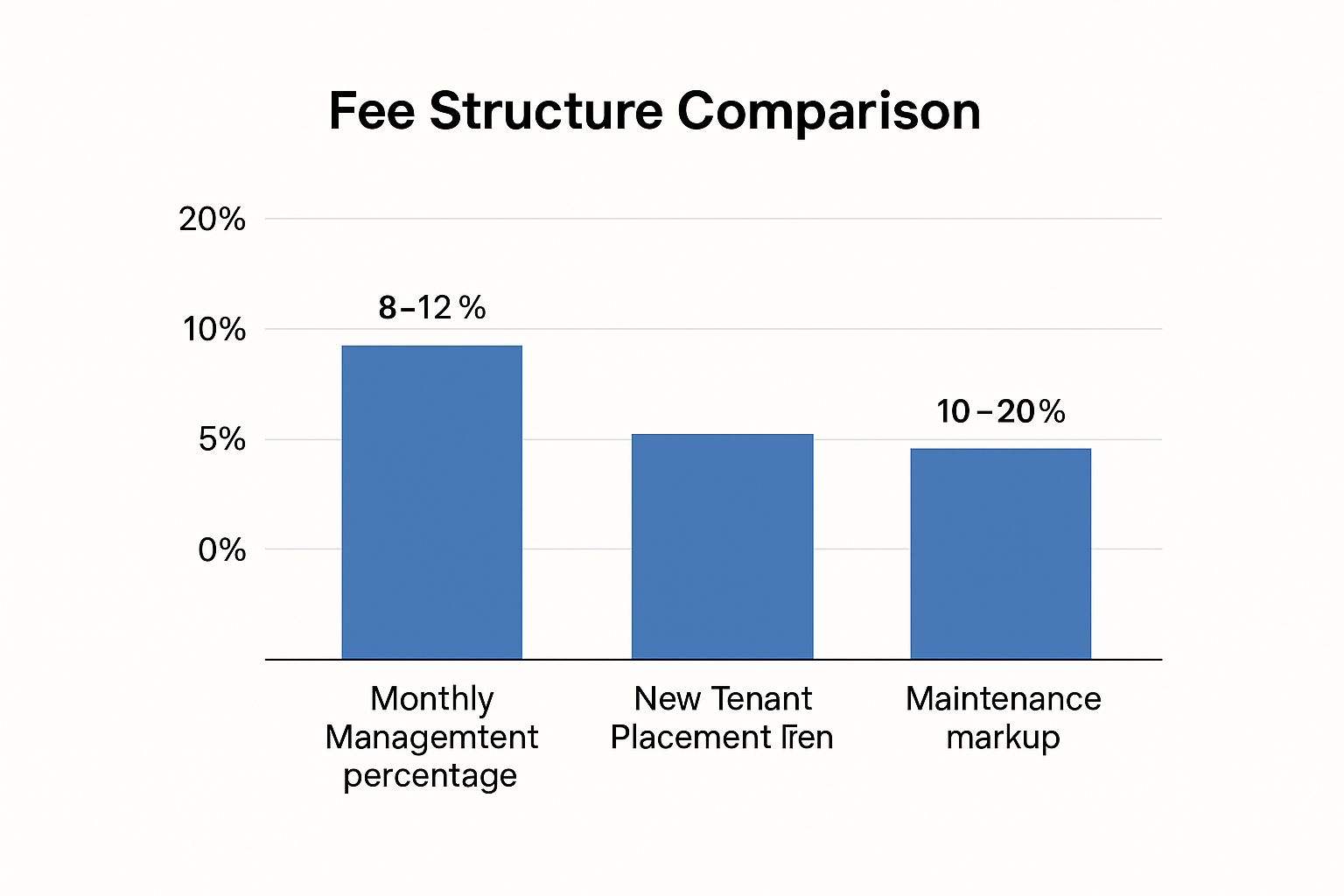How to Find a Property Manager: Expert Tips to Choose Wisely
- Sarah Porter

- Oct 17, 2025
- 14 min read
Updated: Oct 17, 2025
Before you even start Googling "property managers near me," you need to do some soul-searching. Finding the right property manager isn't about picking the first one you find; it's about finding the right partner for your specific investment. The first, and most important, step is to map out exactly what you need.
This initial groundwork sets the stage for everything that follows. Without a clear picture of your ideal manager, you’re just throwing darts in the dark.
Defining Your Ideal Property Manager Profile

Think of it like this: you can't hire the right person for a job if you haven't written the job description. This is your chance to build a checklist that outlines the exact services, skills, and expertise you’re looking for.
Skipping this part is a classic rookie mistake. It almost always leads to mismatched expectations and headaches down the road. You’re not just looking for any manager; you’re looking for the right one for you and your property.
Clarify Your Property's Needs
First, let's talk about the property itself. A manager who excels with luxury downtown condos probably isn't the best fit for a portfolio of student rentals across town. The skills just don't always translate.
Get granular with what your asset truly requires.
Property Type: Is it a single-family home, a duplex, a multi-unit apartment building? Each comes with its own set of management challenges.
Tenant Profile: Who are you renting to? Families? Young professionals? Students? Your tenant base dictates everything from marketing style to communication needs.
Maintenance Level: Is your property brand new and under warranty, or is it an older building that needs a manager with a solid network of reliable, affordable contractors for proactive repairs?
Determine Your Desired Involvement
Now, be honest with yourself. How hands-on do you actually want to be? Are you aiming for a completely passive investment where you just see a deposit in your account each month? Or do you want to be looped in on major decisions?
An out-of-state investor, for instance, will almost certainly need a full-service firm that can handle late-night emergency calls and coordinate with local vendors. But a local landlord who enjoys some of the work might just need help with tenant screening and rent collection.
Knowing what you expect is half the battle. If you're not sure what's even possible, it's worth understanding the full scope of what property managers do. To get a better feel for it, check out our guide on the [essential duties of a property manager](https://www.mypropertymanaged.com/post/what-does-a-property-manager-do-essential-insights).
The most common mistake property owners make is assuming all management companies offer the same service. Creating a detailed profile forces you to define success before you even begin your search, saving you time and stress later.
Your profile also needs to factor in the local market. For commercial properties, for example, vacancy rates are a huge deal. As of Q2 2025, the U.S. prime office vacancy rate was 14.5%—a much healthier figure than the non-prime rate. An experienced manager in a tough market like Dallas or San Francisco will have proven strategies to find and keep great tenants. CBRE offers some great insights into these market outlooks that are worth a read.
Finding the Right Candidates for the Job

Now that you know exactly what you’re looking for in a property manager, it’s time to start building a shortlist. While it’s tempting to just type "property managers near me" into Google, the best leads rarely come from a generic search.
Your goal isn't to create a massive, overwhelming list. Instead, focus on identifying 3-5 highly qualified professionals who actually fit the profile you've built. This targeted approach saves you from drowning in dozens of search results and helps you zero in on managers with direct, proven experience in your specific market and property type.
Start With Your Professional Network
Your first stop should always be the professional network you've already built. Think about it—the people you trust aren't going to recommend someone who would make them look bad. These are the folks who understand your investment goals and know the local real estate scene inside and out.
Your Real Estate Agent: Agents are on the front lines. They constantly work with property managers to help their investor clients and know who’s responsive, professional, and actually gets results.
Your Accountant or Financial Advisor: These pros see the numbers. They know which managers provide clean, accurate financial reports and who consistently maximizes returns for their owners.
Local Contractors or Lenders: Plumbers, electricians, and mortgage brokers have a unique ground-level view. They interact with management companies all the time and can tell you who pays their bills on time and runs a tight ship operationally.
Tap Into Local Investor Groups
Look beyond your immediate circle and tap into the collective knowledge of other local investors. Local Real Estate Investor Associations (REIAs) are an absolute goldmine for honest, unfiltered recommendations.
Members are usually more than happy to share their wins and their horror stories. A quick chat at a meetup or a post in a local REIA online forum can uncover names you'd never find on your own, especially those boutique firms known for incredible service.
Pro Tip: When someone gives you a referral, don't just stop there. Ask a follow-up question like, "What specifically do you like about working with them?" An answer like, "They consistently fill my vacancies in under 15 days" is infinitely more valuable than a generic, "Oh, they're great."
It's also important to find a manager who’s paying attention to the bigger picture. For example, the commercial real estate market is showing incredible strength, with a recent report indicating that 92% of third-party property management firms plan to expand their portfolios in 2025. This growth, especially in hot markets, means a good manager needs to be on top of their game with technology and scaling their operations. You can discover more about these mid-year commercial real estate trends to understand what a forward-thinking manager should be focused on.
Conducting an Insightful Manager Interview
Alright, you've narrowed down your list. Now comes the most important part: the interview. This is your chance to get past the slick marketing and see how these companies really operate. You’re looking for a partner, not just a vendor, and this conversation is where you’ll separate the pros from the pretenders.
A good property manager will actually appreciate tough questions. It shows them you're a serious owner who cares about their property. If you get vague, non-committal answers, that’s a huge red flag. You want someone who can confidently explain their systems because they execute them day-in and day-out.
Questions That Reveal True Competence
Generic questions like "How do you handle maintenance?" will only get you generic answers. You need to dig into the specifics and understand their actual, real-world processes. Think of it like a mechanic walking you through an engine repair—you want to see the nuts and bolts.
Here are a few areas I always focus on:
Tenant Screening: Don't just ask if they screen tenants. Ask them to walk you through their exact process. What are their non-negotiable minimums for credit scores, income-to-rent ratios, and rental history? Do they pull a full credit report and a national criminal background check?
Late Rent Protocol: This is a big one. What happens on day one, day three, and day five after rent is due? A solid manager has a documented, systematic approach that is firm, fair, and legally compliant.
Maintenance Handling: How do they triage routine requests versus a middle-of-the-night emergency call about a burst pipe? Do they have an in-house crew or a network of trusted, vetted contractors? A crucial follow-up question is whether they add a markup or "surcharge" to contractor invoices. Transparency here is key.
For a deeper dive, our guide on the [8 key questions to ask property managers in 2025](https://www.mypropertymanaged.com/post/8-key-questions-to-ask-property-managers-in-2025) will give you a comprehensive checklist to make sure you cover all the critical bases.
Gauging Professionalism and Industry Knowledge
Beyond the daily grind, you need a manager who is a true professional. This isn't just a side hustle for them; it's their career. This means they are constantly learning, staying on top of complex legal changes, and are active in their industry.
A great way to gauge this is to ask about their professional affiliations. For instance, are they members of the National Association of Residential Property Managers (NARPM)? Membership in an organization like this signals a serious commitment to ethics and ongoing education.
When you see credentials like the "Certified Residential Management Company" designation on the NARPM website, you know you're dealing with a firm that has met high industry standards. It tells you they invest in their business and take their role seriously.
A great property manager doesn't just collect rent; they protect your investment. This includes a deep understanding of local and state landlord-tenant laws, which can be a minefield and change constantly. Ask them point-blank how they stay current.
Finally, ask about the technology they use. The property management world is no longer run on spreadsheets. The market is projected to hit $98.88 billion by 2029, and a lot of that growth is fueled by technology.
In fact, the use of AI has jumped from 21% to 34% in just a single year as managers look for better ways to keep occupancy high and operations smooth. A company that uses modern software for owner portals, online rent payments, and transparent financial reporting is simply better equipped to serve you. You can find more eye-opening property management statistics over at resimpli.com.
You've had a great interview and feel good about a candidate. Now comes the moment of truth: digging into their fees and the management contract. This is where a seemingly great deal can fall apart.
A low monthly management fee looks fantastic on the surface, but it's often a smokescreen for a minefield of hidden charges. To make a smart choice, you have to look at the entire financial picture, not just the headline number.
This is how you separate a true partner from a company that profits every time something goes wrong. You're looking for a transparent fee structure that ties their success directly to yours. After all, you want a manager who is motivated to keep your property filled with great, paying tenants—not one who makes their money by nickel-and-diming you on service calls.
What to Expect in Their Fee Structure
Property management fees are anything but standard across the industry, which can make comparing apples to apples a real challenge. Most companies, however, build their pricing around a few key charges. If you understand these, you can dissect any proposal that comes your way.
The Monthly Management Fee: This is the big one, usually a percentage of the monthly rent. It typically falls between 8% and 12%. Here's a critical question to ask: is that percentage based on rent collected or rent due? You want a manager who only gets paid when you do. It keeps them laser-focused on chasing down late payments and filling vacancies.
The New Tenant Placement Fee: Often called a leasing fee, this covers the whole process of finding a new tenant—marketing the vacancy, running showings, screening every application, and drawing up the lease. Expect this to be anywhere from 50% to 100% of the first month's rent.
Maintenance Markups: This is a common one. Some companies will add a surcharge, often 10% to 20%, on top of invoices from outside contractors. It's their fee for coordinating the work. Others might have their own in-house maintenance team with set hourly rates. Either way, you need to know what you're paying for.
A low management percentage might be propped up by high leasing fees or hefty maintenance markups, ultimately costing you more over the year. It’s all about the total cost.

To help you get a clearer picture of what's out there, I've put together a table that breaks down the most common fees you'll encounter.
Comparing Common Property Management Fee Structures
This table breaks down the typical fees charged by property management companies, helping you compare potential costs and identify hidden charges.
Fee Type | Industry Average Range | What It Covers |
|---|---|---|
Monthly Management Fee | 8% - 12% of rent collected | Ongoing services like rent collection, tenant communication, and property oversight. |
New Tenant Placement Fee | 50% - 100% of first month's rent | The entire process of finding and placing a qualified tenant, from marketing to lease signing. |
Lease Renewal Fee | Flat fee ($100 - $300) or % | The administrative work of negotiating and signing a lease extension with an existing tenant. |
Maintenance Markup | 10% - 20% of vendor invoice | A surcharge on third-party repair bills to compensate for coordination and oversight. |
Eviction Fee | Flat fee ($200 - $500) + legal costs | The manager's time spent on the eviction process. This does not usually include court or attorney fees. |
Vacancy Fee | Flat fee or % of one month's rent | A monthly charge while the property is empty to cover basic oversight and marketing efforts. |
Understanding these potential charges is half the battle. If you want to dive even deeper, check out [your guide to property management fee structures](https://www.mypropertymanaged.com/post/your-guide-to-property-management-fee-structures), which explores every possible fee you might come across.
Don't Skim the Management Agreement
The contract is the rulebook for your entire relationship. I can't stress this enough: never, ever sign an agreement you haven't read from start to finish. This legal document lays out everyone's rights and responsibilities, and I promise you, the fine print matters.
Pay very close attention to a few key clauses.
Termination Clause: How do you get out of the agreement if you're unhappy? Look for the notice period (usually 30-90 days) and any penalties for ending the contract early. A fair agreement should always provide a clear and reasonable exit strategy for both sides.
Another critical section to find is owner responsibilities. The contract must spell out the approval process for repairs, especially the dollar amount that requires your sign-off. It should also detail how security deposits and your funds are handled—they absolutely must be kept in a separate trust account, as required by law in most states.
A transparent, easy-to-understand contract is the bedrock of a good partnership.
Making the Final Call: Time to Check References

You’ve sat through the interviews and poured over the contracts. Now comes the part that separates the talkers from the performers: actually checking their references. This isn't just a box to tick; it’s where you find out if the promises they made in the interview hold up in the real world.
Never, ever skip this step. A great property manager will be proud to connect you with their clients. The real gems of information, though, often come from people they didn't put on their hand-picked list.
Dig Deeper Than the "Happy Client" List
Think about it: any company can give you a list of their biggest fans. To get the full picture, you need to talk to more than just the glowing testimonials.
Ask for contact info for at least two current clients and—this is the important part—one *former* client.
A manager who is willing to connect you with someone who left their service is showing incredible confidence and transparency. If they balk at this request? That’s a huge red flag you can't ignore.
Questions That Uncover the Truth
When you get a reference on the phone, your job is to move past the generic "they're great" comments. You need to ask open-ended questions that get them talking about their actual experiences.
Here are a few questions I always ask:
On Communication: "How fast are they with a call or email back? Can you walk me through how they handled a tricky situation you had?"
On Money Matters: "Are the owner statements you get each month easy to understand, accurate, and always on time?"
On Solving Problems: "Tell me about a time they had to handle a real nightmare—a bad tenant, a burst pipe in the middle of the night. What did they do?"
These kinds of questions don't let them off with a simple yes or no. They force the reference to give you a story, and that’s where you learn about a manager's true strengths and weaknesses.
A reference check isn’t just about hunting for red flags. It's about confirming that this is the right fit for you. Hearing another owner describe a communication style that matches exactly what you’re looking for can be the final piece of the puzzle.
Lastly, do a quick professional check-up. Most states demand that property managers have a real estate broker's license, which you can usually verify in minutes on your state’s real estate commission website.
Also, see if they have certifications from industry groups like the National Association of Residential Property Managers (NARPM). This shows they’re serious about their craft and committed to high standards.
Once you have this feedback, you can lay it next to your interview notes and make a decision with real confidence. You're not just hiring a service; you're bringing on a partner to look after a massive investment. This final check ensures that partnership is built on a foundation of trust and proven results.
Got Questions About Hiring a Property Manager? We've Got Answers
Even after you’ve done all the legwork—interviewing candidates, checking references, and comparing notes—a few questions might still be nagging you. That’s completely normal. Getting these final details ironed out is often what separates a decent working relationship from a truly great one.
Let’s walk through some of the most common questions that pop up for property owners right before they sign on the dotted line. Getting clear answers here will give you the confidence you need to move forward.
What’s a Fair Price for a Property Manager?
This is the big one, isn't it? Generally, you can expect to see property management fees fall somewhere between 8% and 12% of the monthly rent collected. But that number isn’t set in stone. The final cost really depends on your property’s type, where it's located, and the exact services you're looking for.
Don't just look at the monthly percentage, though. You need to get the full picture of their fee structure. Be sure to ask them directly about other common charges:
Leasing Fees: For finding and placing a new tenant. This is often 50-100% of the first month's rent.
Maintenance Markups: Do they add a surcharge to invoices from vendors and contractors?
Lease Renewal Fees: A smaller, flat fee for convincing a great tenant to stay another year.
A company with a temptingly low monthly rate might be making up for it with high fees for everything else. Always look at the total potential cost, not just the management percentage.
Does My Property Manager Really Need to Be Licensed?
In most places, yes—absolutely. A manager who is collecting rent, showing units, and handling leases on your behalf is usually required by law to have a real estate broker's license. This license isn't just a formality; it means they've met specific educational, ethical, and legal standards set by the state.
Hiring someone without a license is a huge gamble. It can open you up to serious legal and financial headaches, especially if things go south with a tenant. You can—and should—verify their license on your state's real estate commission website. It’s a simple check that offers invaluable peace of mind.
What Are the Biggest Red Flags I Should Watch For?
As you're vetting potential managers, a few warning signs should give you pause. Disorganized or slow communication is a major one. Think about it: if they’re hard to get a hold of when they’re trying to win your business, how responsive will they be once they have it?
Be wary of anyone who gives you vague, roundabout answers to specific questions about their processes. You want to hear a clear plan for handling late rent or a 2 a.m. maintenance emergency.
A manager who won't provide references from former clients is another serious red flag. It could mean they don't have a history of parting ways on good terms. You're looking for a partner, and transparency is everything in this kind of relationship.
Finally, an unusually low management fee should be treated with skepticism. It often points to a business that nickel-and-dimes its clients with hidden fees, or worse, it’s a sign of subpar service.
What if I'm Unhappy? How Do I Switch Managers?
You are never stuck. You can absolutely change property managers, but you have to do it by the book—the book being your management agreement. Before you sign anything, find the termination clause. This section is your exit strategy.
It will spell out the required notice period (typically 30 to 90 days) and any fees you might owe for ending the contract early. A good, fair agreement will provide a clear and reasonable path for either of you to walk away if the partnership isn't a good fit. Don't let yourself get trapped in a bad situation because you skimmed over the fine print.
At Keshman Property Management, we believe a great partnership is built on transparency and trust. We've been landlords ourselves for over 20 years, so we know firsthand what it takes to protect an investment like yours. Learn more about our straightforward approach to property management and see how we can help maximize your returns.


Comments